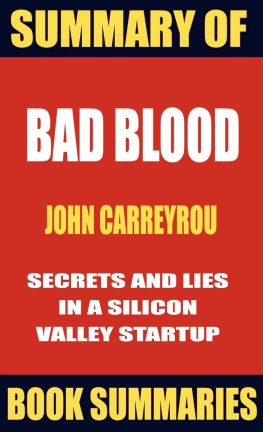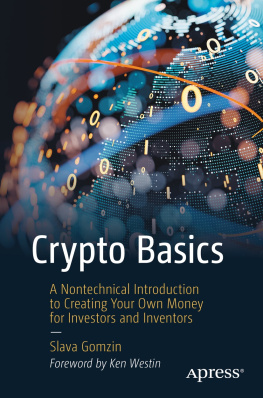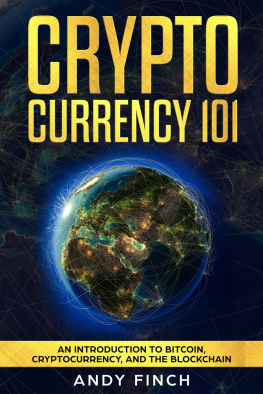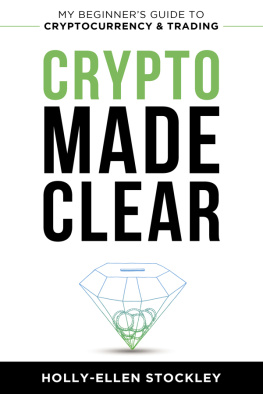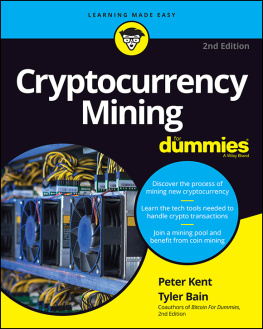Kings
of Crypto
HBR Press Quantity Sales Discounts
Harvard Business Review Press titles are available at significant quantity discounts when purchased in bulk for client gifts, sales promotions, and premiums. Special editions, including books with corporate logos, customized covers, and letters from the company or CEO printed in the front matter, as well as excerpts of existing books, can also be created in large quantities for special needs.
For details and discount information for both print and
ebook formats, contact ,
tel. 800-988-0886, or www.hbr.org/bulksales.
Copyright 2021 Jeff John Roberts
All rights reserved
Printed in the United States of America
10 9 8 7 6 5 4 3 2 1
No part of this publication may be reproduced, stored in or introduced into a retrieval system, or transmitted, in any form, or by any means (electronic, mechanical, photocopying, recording, or otherwise), without the prior permission of the publisher. Requests for permission should be directed to , or mailed to Permissions, Harvard Business School Publishing, 60 Harvard Way, Boston, Massachusetts 02163.
The web addresses referenced in this book were live and correct at the time of the books publication but may be subject to change.
Library of Congress Cataloging-in-Publication Data
Names: Roberts, Jeff John, author.
Title: Kings of crypto : one startups quest to take cryptocurrency out of Silicon Valley and onto Wall Street / Jeff John Roberts.
Description: Boston, MA : Harvard Business Review Press, [2020] | Includes index.
Identifiers: LCCN 2020036284 (print) | LCCN 2020036285 (ebook) | ISBN 9781647820183 (hardcover) | ISBN 9781647820190 (ebook)
Subjects: LCSH: Armstrong, Brian, 1983- | Cryptocurrencies. | CryptocurrenciesUnited States. | MoneyUnited States. | Currency question.
Classification: LCC HG1710.3 .R85 2020 (print) | LCC HG1710.3 (ebook) | DDC 332.4dc23
LC record available at https://lccn.loc.gov/2020036284
LC ebook record available at https://lccn.loc.gov/2020036285
ISBN: 978-1-64782-018-3
eISBN: 978-1-64782-019-0
The paper used in this publication meets the requirements of the American National Standard for Permanence of Paper for Publications and Documents in Libraries and Archives Z39.48-1992.
For my wife, Amy
Contents
A Note on Sources
I first encountered bitcoin and Coinbase in 2013. I was a reporter at the tech blog GigaOm, where I reported on collisions between law and technologyincluding the then-novel phenomenon of cryptocurrency. On a hot July day, I set out to investigate an event called Satoshi Square, which took place in a corner of New Yorks Union Square. Believing I would need a bitcoin to participate, I bought one for $70 from Coinbase, intending to expense it. Happily, I forgot to do so and ended up holding on to itand sold half of it later that year when the price hit what seemed to be an absurd high of $800.
Since then, I have been fascinated with cryptocurrency and the role Coinbase has played in bringing it to the general public. I have written about the company numerous times since 2013 for GigaOm and for Fortune magazine.
In researching this book, I drew on my earlier work and also conducted numerous additional interviews with Coinbase executives and board members. I also interviewed many other influential figures in the cryptocurrency world, including academics, investors, and those close to Coinbases competitors. Most of the accounts in this book, including nearly all of the quotes attributed to people at Coinbase, are from those interviews.
I have also drawn extensively on secondary material, including news reports from Wired, theNew York Times, Forbes, and Coindesk. The reporting in Kings of Crypto also makes use of the excellent first generation of cryptocurrency histories, including Digital Gold, The Age of Cryptocurrency, and Blockchain Revolution. When I have relied on material directly from these sources for my own narrative, Ive made every effort to identify them accordingly.
Finally, this work represents a more polished version of the audio version of Kings of Crypto, which came out in May 2020. The book you now hold in your hands includes more recent news surrounding Coinbase and corrects several minor errors.
PART ONE
From Open
Secret to
Civil War
1
Brian Has
a Secret
B rian Armstrong stepped out of his car, felt soft California sunshine on his bald head, and smelled eucalyptus. He gazed at the faade of Y Combinator: the one-story building, just five miles from Googles Mountain View campus, looked more like a sleepy suburban office park than a famous startup school that had educated the founders of Stripe, Dropbox, and other billion-dollar companies. Brian didnt care about the places humdrum appearance. He knew who had gone there before him. The founders of Airbnb, a company hed just left, had come out of Y Combinator, and so had the CEOs of other Silicon Valley stars like Doordash, Twitch, and Reddit. Brian, pale and shy-looking at first glance, exuded a quiet confidence from his trim frame and wasnt bothered that hed broken up with his would-be cofounder just days before, making him the rare entrepreneur to do the program alone. It was the summer of 2012, and Brian was brimming with certainty that he would build Y Combinators next famous startup.
It wasnt always this way. Twelve miles to the south, in San Jose, is where Brian had spent his early teenage years in the 1990s, restless and vaguely unhappy. San Jose is the tenth-largest city in the country and the hub of Silicon Valley, but it could still feelthen and nowlike a lifeless parking lot where many people have nothing to do. Brian felt like that a lot. Until the internet.
As it had for so many other intelligent but introverted kids, the appearance of the World Wide Web brought friends to Brian as well as a flood of exciting ideas. Being stuck in poky San Jose didnt matter now that he had a global community of hackers and philosophers at his keyboard. By the time he arrived at Rice University in 2001, Brian knew he wanted to use the internet to remake the world in the way an earlier generation of tech visionaries had done with microchips and desktop computers.
But there was a problem.
I always had this thought, I wish I was born a bit sooner. By the time I graduated from college and I was starting to work, I worried maybe I was too late, Brian recalls. The formative internet companies had been built, and the revolution had happened.
He was wrong, of course. The internet revolution is still blazing, and entrepreneurs, for better and worse, are using it to remake our homes and our lives. And in late 2008, a mysterious person using the name Satoshi Nakamoto published a nine-page white paper on the web that would bring that same revolution to money. Brian discovered that paper a year later.
It was Christmas, and Brian was in his old room back at his parents house in San Jose, reading tech news on the internet, as usual. Someone had posted Satoshis paper on a computer discussion forum. Right away, he was rapt. He read and then reread what the paper described: a new type of digital currency known as bitcoin that operated outside the realm of any bank, company, or government. Bitcoin kept track of who paid whom just as a bank did, but the transactions were recorded by random people on computers scattered around the globe. It was real money without banks or borders. Brian began reading Satoshis paper a third time, ignoring his mothers calls from downstairs to join the family for dinner.
Two and a half years later, as he walked through the doors of Y Combinator, Brian was more fixated on bitcoin than ever. By now, he had developed a special insight of his own about the currency, one that he would soon deliver to millions of people.


